GSM module for heating boilers: organizing heating control from a distance
The uninterrupted and correct functioning of the heating system is one of the indicators of a comfortable life in any house or apartment.Using such modern equipment as a GSM module for heating boilers, you can remotely control the boiler room using mobile communications. But this is very convenient, don’t you agree?
We suggest you understand how the innovative control system works, what basic and additional functions the GSM module can perform. To help you understand how advisable it is to invest in the purchase of such equipment, we have listed the advantages and disadvantages of remote monitoring.
In addition, we have prepared a review of popular GSM module models, and also outlined the nuances of installing it, connecting to the phone and setting optimal parameters.
The content of the article:
How does the GSM module work?
The process of controlling the operation of the boiler occurs thanks to a small device that has a built-in adjustable processor (controller). It processes and transmits data from the boiler to the user and vice versa (feedback function) in the form of text messages.
The main task of the module is to maintain previously specified settings and quickly respond to any changes in autonomous heating.
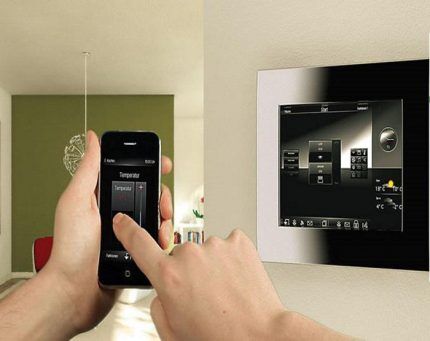
Such equipment will be especially useful for owners of dachas, country houses, or those who often leave their homes unattended for a long time.The GSM module can act as part of the control heating in a smart home.
What is included in the GSM kit
The contents depend on the manufacturer and model of the product. The following parts are included as standard.
Controller (GSM module) — a device with a different number of inputs, expandable if you need to connect additional functions. Models in the low price segment contain a couple of standard functions and operating modes. More expensive devices have a pre-built control regulator for a week.
Portable temperature sensors, from two to ten - it depends on the type of module. Designed for different rooms, including outdoor ones. The optimal number is five, provided that one of them will be on the street.
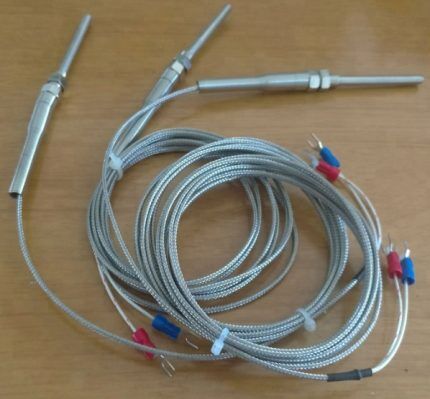
GSM antenna necessary to amplify the signal. She is responsible for establishing uninterrupted communication with the owner of the equipment and with the towers of the cellular operator.
Through relay (in most models up to 3 pcs.) feedback from the owner is implemented. In the user manual for all modules there is a list of codes that characterize all normal and abnormal situations and codes for feedback.
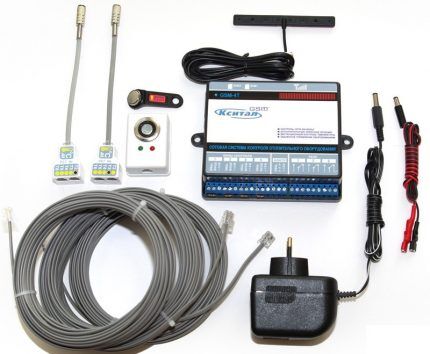
Additional sensors (such as movement and fire) are also necessary. More often, users independently purchase them depending on their needs.
Battery may additionally be present in some models. Manufacturers most often use lithium-ion.This is an important component because battery life depends on it. If the voltage is turned off, the power will automatically transfer to the battery.
The battery capacity should be enough for full operation of the GSM module for at least five hours, preferably up to two days. If you know that power outages occur frequently in your area, then it makes sense to purchase a battery with a larger capacity.
Master key prevents third parties from interfering with the heating system and removes the locks you have set.
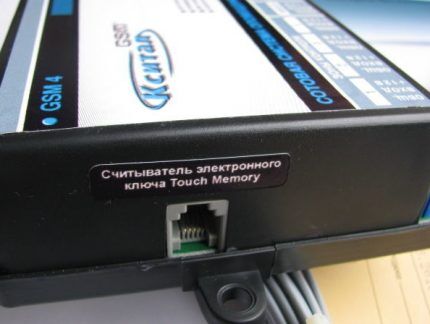
In addition, the kit includes an electronic key reader, a touch screen, connectors for connecting to the boiler, and coils of connecting wires. If necessary, you can purchase additional components or “assemble” the set to suit your needs.
Remote controller functionality
The number of functions in any GSM module is limited and is determined by the following factors: the number of channels and, accordingly, sensors that can be connected through them, remote control features, as well as the ability to regulate heating indicators.
Basic and additional options
A standard set of sensors scans temperature, pressure and registers gas leak, setting up additional – automatically enables new functions. Such sensors can be digital or analog. More often, manufacturers use analog ones, but this depends on the interface of the module itself.
The listed main functions guarantee uninterrupted and stable control of the heating system and implement the operating principles of the device:
- Switching the entire heating system on and off.
- Possibility to turn on/off, reboot the boiler or additional equipment.
- Remotely change the boiler operation settings, temperature intensity in the whole house or in a separate room, simply by sending an SMS with the required code. This will reduce gas consumption to 25-30%.
- Daily information via mobile messages about the state of the boiler, namely: notifications about operating parameters, temperature conditions, and, if necessary, about emergency situations, automatic shutdown of the device due to breakdowns.
- Using a pin code for the SIM card to avoid connection by third parties and any fraud.
- Prompt notification of an emergency shutdown of the heating system due to a fire, leak or any breakdown, if the owner has previously connected additional response sensors for them. The intelligent system, in the event of an emergency, takes steps itself. For example, in the event of a gas leak, the boiler or all equipment is turned off.
- Electrical voltage stability control - protection against sudden energy surges.
- Autonomous mode of operation of the controller - it is ensured by the presence of a battery. If the power goes out, the module will run on this battery. But remember that when the power is turned off, only the message sending function will work, since the boiler requires continuous current to operate.
- By reducing the heating load, the service life of the equipment increases.
Users set in advance the minimum and maximum permissible values of parameters (for example, temperature conditions). When the indicators go beyond the specified range, the owner receives an SMS message about this.
Some modern modifications of GSM modules can display statistics on boiler operation in the form of creating time graphs.

If you are going abroad and roaming is expensive, then you can use one of the other numbers. In some module models, control via voice messages is available.
The functionality, even with standard equipment, is high. As a result, the user will be able to fully control the heating and other systems in his absence.
Additional functions are not fundamental when choosing a module, but they significantly simplify the life of owners:
- Possibility to connect an additional relay for new sensors.
- Launching additional equipment and the ability to control it using a cell phone from a distance.
- Pressure control function in a solid fuel boiler.
- Monitoring the level of diesel fuel if the boiler is using liquid fuel.
- Calculation of the quantity and quality of pellets in the compartment of a pellet heating unit.
- Checking the boiler feeder.
- Turn on the emergency siren.
If you install additional sensors, you will be able to perform the following functions:
- premises security if there are motion sensors (can be internal - for the house and external - for the site);
- fire protection function guarantees a smoke indicator - the user specifies the limit numbers in advance;
- flood warning — leak sensor will give a signal and shut off the water.
It is the various sensors and correct configuration of the module that guarantee that you will know exactly what is happening with all the controlled equipment.
Modes of equipment use
The selected control mode determines when and what information you will receive about the operation of the controlled equipment:
- Auto, in which the system operates according to previously established parameters, analyzing information throughout the house or in individual heated rooms. You receive a report on the heating operation at a specified time.
- Manual (feedback from the user to the system) involves the user sending a message with a code word or making a call to change certain settings or modes. For example, you want to know the temperature in a certain room or increase it to warm up the entire house.
- Anxious. If there is a power failure, smoke, a leak, gas surges, incorrect operation of equipment (the boiler stops working due to some kind of breakdown), then you will promptly receive a message about the breakdown.
In the latter situation, the module can block the damaged element or turn off the entire system. In addition, during an accident, alarm SMS messages are sent to all previously specified numbers.
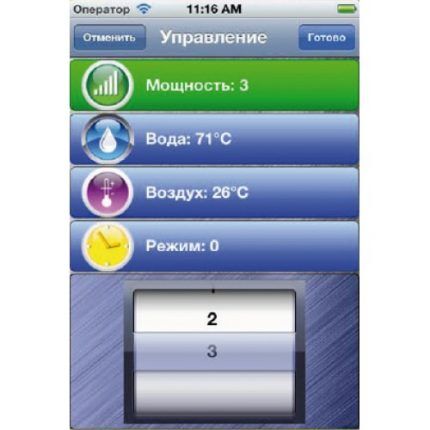
All three modes are available in standard modules, but it is important to configure their operation correctly when installing the system.
Popular models according to user ratings
The list includes popular models on the Russian market with the optimal combination of price and quality:
- Xital GSM with modifications 4T, 8T and 12T - the numbers indicate the number of zones/rooms that can be controlled. The device is suitable for any boiler, the cost is from 8 to 10 thousand rubles.
- Sapsan Pro 6 for any boiler equipment, you can assign up to 10 numbers. Cost from 10 to 16,500 rubles.
- Telcom 2 only for De Dietrich, involves connecting up to 5 numbers.
- GSM module from Teplocom Suitable for any heating system and requires minimal settings. They ask from 6,000 rubles.
- Vitocom 100 only for Viessmann, a maximum of two numbers can be connected. The price varies from 26 to 30 thousand rubles.
- Logomatic PRO GSM only for Buderus (more often used for floor-standing boilers), the maximum number of rooms is 16. This model will cost 30,000 rubles.
When choosing, focus on how much equipment you want to control, what power it is, what additional indicators you want to connect and the characteristics of the thermal regime in the room.
Installation features from the consumer's point of view
Whoever installs the GSM module (you yourself or a specialist), be sure to make sure that these conditions are met:
- Optimal humidity is maintained at the installation site, as when installing the boiler;
- if there is no portable antenna, then check that there is nothing obstructing the signal transmission, for example, a concrete ceiling;
- pay attention to the length of the antenna cable if you need to take it to another location;
- connect the module with the boiler turned off and through RCD, in order to protect equipment from power surges;
- Check in advance that the distance between the temperature sensor and the controller is no more than one hundred meters - for better communication.
At the beginning of work, you must enter the phone numbers to which information will be sent. Then you will receive a verification code in the form of an SMS.
When you purchase a new card, immediately top up your account with at least 300 rubles and ask the operator to turn off all messages with paid advertising so that it does not take up space and confuse the controller. Please note that the cellular operator in the area where such a module is installed must have an uninterrupted signal.

After installation, be sure to test the operation of the GSM module. Let someone go outside with the phone, and someone stay in the house. It is important to check how quickly messages will be received when certain changes in boiler operation occur.

It is also necessary to configure the temperature regime, which is regulated by street and room sensors. Before doing this, please note that the documentation for the boiler indicates the minimum and maximum temperatures at which it will operate without failure.
The room sensor is responsible for the thermal conditions inside the room. In some models it can be set for the whole week. For example, on weekdays, three types of temperature settings are relevant: in the morning and evening - high, because everyone is at home, during the day - low, at night - also low or closer to average for a comfortable sleep.
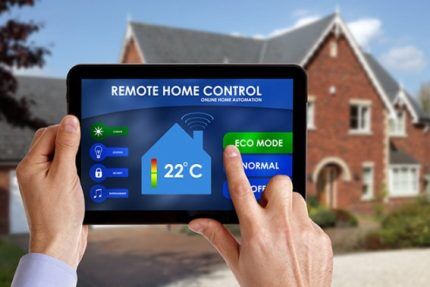
Everyone is at home on the weekend, so choose the heating that is most comfortable for the whole family. This mode is called “general”. If you want to set the temperature in individual rooms, then turn on “zonal”. It is responsible for heating the air in individual rooms.
In the “vacation” mode (the names of the modes differ among different manufacturers), the temperature is at the very minimum. In this case, you can remotely control the autonomous unit to change the temperature.
For example, while on the way home, send an SMS with a special code or simply enter the required number to change the temperature mode.
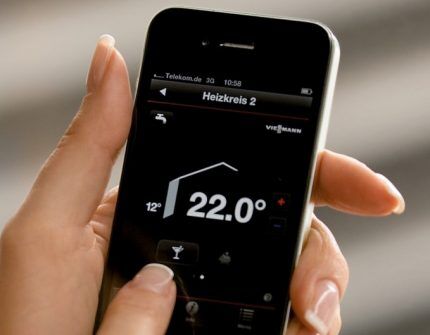
If a boiler is also connected to the system, then you can change not only the water temperature, but also the heating system. When switching to summer mode, the boiler does not turn off, but operates at minimum power.
Please note that there is an “anti-freeze” mode, which turns on the boiler from time to time to maintain the correct operation of the entire heating system.
The outdoor sensor reacts to changes in temperature outside the window. Experts call this mode the most promising. If the temperature drops, the boiler automatically raises the temperature.
After installation, also test the feedback from the autonomous heating. To do this, send a message with a command code.
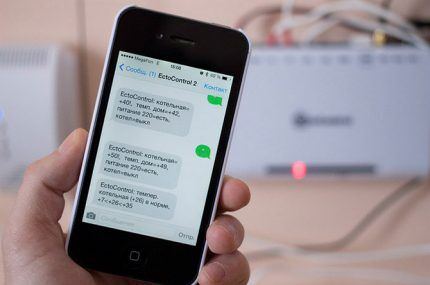
Technically, communication is realized through a relay, which is directly connected to the gas boiler.
Advantages and disadvantages of GSM devices
This is what the client will receive by connecting the GSM module:
Safety. The main purpose of the GSM module is to control the heating system and additional equipment, timely informing about existing or possible breakdowns. By connecting, for example, an additional broken glass sensor, you can quickly react if thieves break into your house.
Comfort. Management of key indicators of heating and related systems without the physical presence of the consumer next to them. For example, when returning home, you can easily preheat the water in the boiler to the required levels or increase the temperature in the entire house by sending one message.
Saving. When no one is home, the temperature can be as low as possible, and you will thus reduce your heat bill by a significant amount. And the absence of constant load on the heating system will help extend the life of the boiler, boiler and other equipment.
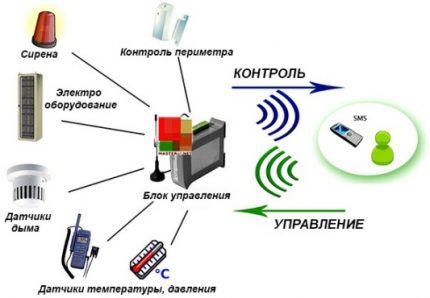
Thanks to these three advantages, the commercial attractiveness of the module is formed.
And GSM equipment also has its drawbacks. Fundamental, of course, is the high price of the device.
Users note the need to constantly monitor the cash balance of cellular communications, dependence on the operator’s work and coverage. This is especially inconvenient for owners of houses outside the city or in villages remote from metropolitan areas.
Additional disadvantages include: the complexity of self-connection and additional installation costs.
Conclusions and useful video on the topic
Detailed video about the feasibility of connecting a GSM module. Peculiarities of work using the example of manufacturers Teplocom and Xital.Example of module location near the boiler.
Installation instructions for the Xital system. The narrator is a professional builder. He goes into detail about installation challenges and details to pay attention to.
Video commentary about the operation of the Teplocom gsm module. The installation features are shown using the example of Bastion boiler equipment.
Despite the disadvantages of purchasing, such a module will significantly simplify your life, save money in the future by extending the life of the equipment and reducing utility bills. In addition, the device will protect against unforeseen situations with equipment and protect an empty house from strangers.
Thanks to such multifunctional equipment, you can always return to a warm and cozy home without fear that the boiler has broken down.
Share with readers your experience of using a GSM module for heating boilers. Please leave comments on the article, ask questions and participate in discussions. The feedback form is located below.



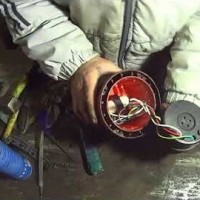
I am a lover of all kinds of technical innovations that really improve a person’s life and make his life more comfortable and cozy. Therefore, when I learned about the possibility of controlling the heat at home from a distance, I purchased this very GSM kit. I installed everything myself, it's not difficult. Now, if something goes wrong, an SMS comes and notifies you of the problem. You can even set the “Vacation” mode with a minimum temperature so that the house does not become damp, but also saves fuel. Very convenient, the cost is certainly not cheap, but worth it.
Yuri, where is it cheap now? Especially in the conditions of our economy, and even in a country where progress comes late.As for me, you still saved on this, since there are more modern and advanced technologies related to controlling boilers and other things from a distance. The “vacation” mode, in my opinion, is also not a good idea. You never know what can happen. Technology cannot be trusted 100%
I'm wondering if there is a similar theme for gas boilers with a web interface/Wi-Fi module that would work through a smartphone application? Control via SMS seems like a rather outdated solution to me. And I don’t want to spend extra money on it every month. I have a Viessmann gas boiler, and there are no interruptions in electricity or internet at home.
In fact, you correctly noted that the GSM module is an outdated solution, but at the same time it is more reliable. If you want advanced functionality with the ability to control the boiler through an application on a smartphone, for example, then I advise you to use a thermostat (thermostat). In particular, the Teplolux MCS 350 model, which will allow you to program the boiler to the desired operating modes, as well as change these settings through a proprietary application for smartphones.
The cost of such a device is about $120 and is connected to most modern heating boilers. The connection occurs via a Wi-Fi module. If you need a cheaper model, then you can consider the Wi-Fi thermostat PWT 002, costing $50.